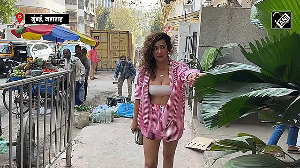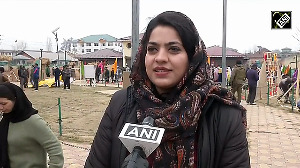Twenty-three years ago, soon after I landed up at the crowded Dadar station in north-central Mumbai hoping to make this incredibly high-energy city home and went about the task earnestly, one thing struck me as odd.
It was the absence of Marathi around me.
I found it odd because in the city I considered home till then, Chennai, Tamil, the local language, was in your face, as were all things associated with the language and culture.
You had to know Tamil to survive there; and you wore your non-knowledge of Hindi as a badge of honour. As a youth it was de rigueur to take part in agitations against the 'imposition' of Hindi. If you received a lathi on the back or cooled your heels in the police lockup for a day for tarring a signboard, you were a local hero.
The stupidity of it all hit me when I left the state's boundaries. Knowing the local language wherever you are, I still hold, is an absolute must, but my youthful aggression has subsequently been tempered today to say you need to know the local language plus the national language. It is not an either-or situation, as seems to be the case in aamchi Mumbai.
So I found it odd that in Maharashtra's capital I went about learning not Marathi, but Hindi.
I found it extremely odd, and still do, that that you can live all your life in Maharashtra's capital without speaking a word of Marathi.
I found it odd that barring pockets in Maharashtra's capital, there was nothing visibly Maharashtrian about Mumbai.
I couldn't help contrasting it with the city I came from. My god, back home this can never happen, I thought then; today, seeing the influx of 'outsiders' in once-conservative Chennai every time I visit, I wonder if it too will go the way of Mumbai, where all things Tamil will be confined to smaller and smaller pockets till one fine day the only place you will find them in will be the local museum. As an endangered species.
Oh, but Mumbai is a cosmopolitan city, you don't need to know Marathi here: I have this line thrown at me umpteen times that it doesn't raise my hackles anymore.
Is cosmopolitanism a ticket to erase the local identity, ignore the local language and thereby an important part of the local ethos, I have argued with friends who wore their non-knowledge of Marathi on their sleeve like I once did with Hindi.
I think it is a matter of shame that after 23 years in the city my Hindi is better than my Marathi.
I think it is a disgrace that there are scores and scores of schools in the city that don't think it is necessary to teach Marathi, and there are more being set up.
I think it is pathetic that we, the non-Maharashtrians who have made our home and millions in this city, don't give a damn to the concerns of the local population.
Isn't it hypocritical that we who berate the religious minorities day after day for not 'assimilating fully' with the majority, whatever we mean by that, are loath to do the same when it comes to language?
Just look at the furore over the Marathi signboards in Mumbai. For the life of me I can't figure out what the problem is in with having them in Devnagari and in English, with the former in bigger font. Devnagari is also Hindi, you morons, we may all not speak Marathi and look down on it but most if not all of us barring the newbies to the city know that language, I want to tell the critics.
Twenty-three years ago I wondered why no political party was articulating the locals' angst at being overrun by others. Oh you mean the Shiv Sena, scorned those in the know, it can't win any election, it can only beat up Madrasis.
Then the inevitable happened. That party won the elections to the Brihanmumbai Municipal Corporation. Against an uproar of protests and condemnations it changed the name of the city to Mumbai; how Bombay became less of a city on being called Mumbai, I couldn't, and still can't, figure out. Still there are hordes that refuse to call the city by its original name, as if mentioning it would get them a day in jail or worse.
But the Shiv Sena soon calculated that while local support will only bring it the municipality, to win the state's power-centre Mantralaya it needs to appeal to a larger section and went easy on its original plank. Beyond lip service to the Maharashtrian cause and Marathi, it did sweet little. Oh, how steep the price for ruling cosmopolitan Mumbai!
Today another Thackeray has taken over the job of articulating the native angst, and I hope he does a better job of it than his uncle.
I have my own theory on why Raj Thackeray, whose political party has blue (for Dalits), saffron (for Hindus) and green (for Muslims) on its flag, decided to go agro on the locals issue.
Last year's civic elections in Mumbai proved to him that more than anything else, it was the consolidation of the 'outsider vote' -- read from UP and Bihar -- that led to his Maharashtra Navnirman Sena putting up a less than expected performance.
And since then he has upped the mercury in his campaign against the communities he believes ganged up against him. In civic ward after civic ward in Mumbai, like mine for instance, it is an open secret that migrant labour may not have their families with them but they sure have a vote which they cast on the say-so of their local benefactor.
There is no way Raj Thackeray can break this nexus; so he decided to go after the Maharashtrian cause full-throttle.
Does it mean that he doesn't really believe in the cause he has been articulating? I don't know.
But I do know that the cause he has robbed from under the Shiv Sena's nose has tremendous emotive value to a section that increasingly thinks it is being squeezed out from its city.
In Mumbai either we take pride in not knowing Marathi despite having lived here for years, or speak the language to the support staff -- the office peons, the driver, the bai, but that too only a smattering, mind. After all we don't know Marathi.
It is only in Mumbai you can get away with this. You can't treat the local language so shabbily in any of the other metros. I know you can't do this to Tamil in Chennai.
You can blame the soft-hearted, decent Maharashtrian for meekly standing by while the rest of us made the most of the opportunities in the City of Gold if it soothes your conscience, but the fact is the rest of us have misused and abused the hospitality and warmth shown by the Maharashtrians to us. I am not sure how much longer he will remain a mute spectator.
And when that happens, we will have it brought upon ourselves by consistently downgrading Marathi, denying Mumbai its Maharashtrian heart, and being terrible citizens in a great city.






 © 2025
© 2025